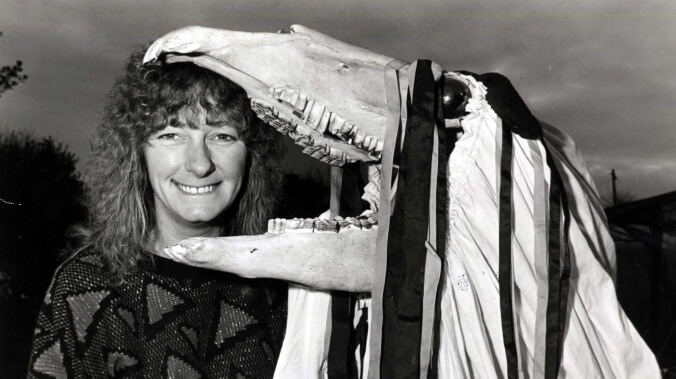Preparing for Mari Lwyd, 1988. Photo: Western Mail Archive/Mirrorpix/Getty Images
This week’s entry: Mari Lwyd
What it’s about: The incredibly festive combination of two very terrifying things: a horse skull and sing-alongs. Yes, it’s all part of a completely normal Welsh Christmas, as wassailing with a horse skull on a pole has been a holiday tradition for at least 200 years in the land of song. A Mari Lwyd party generally includes four to seven people, one of whom holds a skeletal horse’s head on a pole (the Mari Lwyd in question), while wrapped in a sheet that covers both pole and bearer and serves as the body of the horse. They’re usually accompanied by a Leader, a musician (called the Merryman), and a few other people dressed in character, often that of Punch and Judy, the central characters in the traditional British puppet show that bears their name.
Biggest controversy: No one’s exactly sure how this horse-head-on-a-stick thing began. For starters, folklorists disagree over the name, which doesn’t have a literal translation in modern Welsh. Some think it translates to “Holy Mary”; others think it means “Grey Mare.” Along similar lines, there’s debate as to whether the tradition has pre-Christian religious origins (although the first published account of Mari Lwyd dates to 1800) and either was or wasn’t Christianized later, or grew out of the medieval Christian Feast of the Ass. (No, that’s not about what you might think; the Feast of the Ass celebrated the donkey that carried Mary, Joseph, and Baby Jesus into Egypt.)
Strangest fact: Traditionally, one is supposed to not be a gracious host when a skeletal horse head appears through your peephole. Mari Lwyd tradition holds that before the party of wassailers enters a house, they sing a song requesting admittance. Their neighbors have to come up with an excuse why the party can’t or shouldn’t enter. They sing another verse, the neighbors come up with another excuse, and this continues until the excuse-makers run out of ideas. (Some Welsh communities skip this back-and-forth and simply let the wassailers in after the first verse.) Once inside, the Merryman entertains the household with songs, while Mari Lwyd neighs and snaps its jaws, attempting to frighten children and adults alike, while the group’s Leader pretends to restrain it. Then onto the next house for more mayhem.
Thing we were happiest to learn: After a 19th-century decline, Mari Lwyd has made a comeback. During the Welsh Methodist revival of the late 1700s, Mari Lwyd and other folk traditions were attacked for being sinful. In fact, nearly as soon as Mari Lwyd was first mentioned in print, some writers were lamenting the effect Christian scolds were having on it and other folk traditions, with the harpist Edward Jones writing that Wales, “formerly one of the merriest and happiest countries in the World, is now becoming one of the dullest.”
However, while Mari Lwyd largely died out in the early 20th century, a few tradition-minded Welsh kept the tradition alive, until it began to make a comeback in the 1960s. By 1980, there was such a resurgence in Mari Lwyd sightings that “there [were] complaints if she [missed] any of her regular calls.” In recent decades, it’s become a point of Welsh pride to keep the tradition alive.
Thing we were unhappiest to learn: Surprisingly, not all horse-skull-related traditions are as wholesome as Mari Lwyd. In the late 1800s, North Wales practiced “giving a skull,” in which a horse or donkey skull was placed over a woman’s front door on May Day “as a sign of contempt.” Along similar lines, charivari was a folk tradition in which a community would stage a parade with discordant music, designed to publicly shame people for transgressions including adultery, domestic abuse, giving birth to a child while out of wedlock, and even May-December romances. In these parades, people would sometimes burn someone in effigy, sometimes use a mocking impersonator, and sometimes even drag the wrongdoers out of their homes to be paraded through town against their will. Charivaris were held across Europe; the Welsh variation included a horse skull, sometimes with horns attached, as part of the procession.
Also noteworthy: Mari Lwyd has broken through to popular culture a few times. Vernon Watkins’ 1941 poem “Ballad Of The Mari Lwyd” was called “one of the outstanding poems of the century” by former archbishop of Canterbury Rowan Williams. In Silver On The Tree, the final book in Susan Cooper’s The Dark Is Rising series, Mari Lwyd makes an appearance during the book’s final confrontation between good and evil (Wikipedia does not reveal on which side).
Further down the Wormhole: Mari Lwyd celebrations don’t have a fixed date, but are usually held in the vicinity of Christmas and New Year’s. (Side note: Wikipedia’s New Year’s page has a GIF of fireworks as its topmost image, the first use of GIFs we’ve seen on the site.) We’re taking next week off for the holidays, so Wiki Wormhole will return in 2020, and while the year will no doubt be dominated by an extremely tedious debate over whether The Rise Of Skywalker was the best or worst movie ever made, and of course by America’s 59th and final presidential election, we choose to start the year with something uplifting, literally and figuratively. We’ll start getting psyched up for Mars 2020, a mission scheduled for July that will put another rover on the red planet, this one looking for past life on Mars, and one that takes another crucial step toward humans visiting another planet. Until then, have a Happy New Year!









































